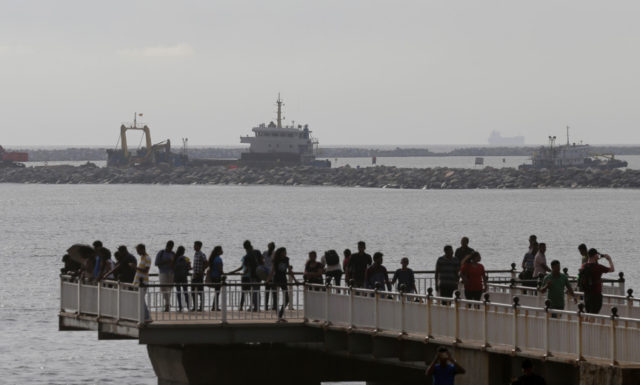The debt-ridden island nation of Sri Lanka reportedly signed two Belt and Road Initiative (BRI)-linked contracts worth more than $50 million with China on Thursday amid political upheaval in the South Asian country over the appointment of a pro-Beijing premier.
China is facing criticism that many of its investments under BRI are driving smaller nations like Sri Lanka into debt. Sri Lanka is among the most negatively affected by its relationship with China, having forfeited control of its key Hambantota seaport in December 2017. Sri Lanka gave China power over the port as a means of paying an installment of its debt it could not afford at the time.
U.S. President Donald Trump’s administration has blasted China for using debt traps via Beijing’s BRI project, also known as the One Belt One Road (OBOR) initiative, to undermine the sovereignty of various countries and expand its influence across the world.
Reuters reported that the multi-million dollar contracts that Sri Lanka signed with Chinese firms on Thursday for a port upgrade project came “in the middle of a political hiatus that has raised doubts over the legitimacy of the government and the legality of the deals,” adding:
The debt-saddled island has long been a target of Beijing’s ambitious Belt and Road infrastructure scheme to connect China with countries cross Asia and beyond, while regional power India has also been vying for deals to counter China’s influence.
But a political crisis triggered by President Maithripala Sirisena’s replacement of [pro-India] Prime Minister Ranil Wickremesinghe with [pro-China] Mahinda Rajapaksa, who was in turn sacked by parliament, has raised doubts over who can legitimately make decisions in the country.
The new government has reportedly failed to earn international recognition.
Citing government documents about the financial agreements Sri Lanka made with China, Reuters pointed out, “The deals are a $32 million contract to enhance the deep berth capacity of state-run Jaya Container Terminal (JCT) in Colombo with China Harbour Engineering Company, and another one worth $25.7 million for the purchase of three cranes from Shanghai Zhenhua Heavy Industries for the same project, according to the ports authority official.”
However, Rajitha Senaratne, the former cabinet spokesperson under the replaced PM, told Reuters the new administration does not “have the legal power” to make any decisions.
In a separate article, Reuters pointed out:
Sri Lanka’s parliament cut the budget of the Prime Minister’s office on Thursday, a move designed to hinder disputed premier Mahinda Rajapaksa whose supporters boycotted the vote in the latest twist in a weeks-long political standoff.
Lawmakers opposed to Rajapaksa, who has lost two no-confidence votes in parliament, regard his administration as illegitimate and say he should not be able to use government money for his day-to-day expenses.
The rivalry between Asian giants China and India is at full display in Sri Lanka.
“India, which accounts for around 80 percent of Colombo’s trans-shipment business, has raised concerns over increasing Chinese projects in Colombo,” Reuters noted.
“Although the political tussle in Sri Lanka was largely triggered by deep differences between President Sirisena and Wickemesinghe, who led a fragile coalition, observers say the shadow of India and China is not far away,” Voice of America (VOA) added last week.
Harinda Vidanage, the director of the Bandaranaike Center for International Studies in the island nation’s capital of Colombo, told VOA, “The larger context of the current political situation is clearly the intensifying India-China rivalry in countries like Sri Lanka.”

COMMENTS
Please let us know if you're having issues with commenting.